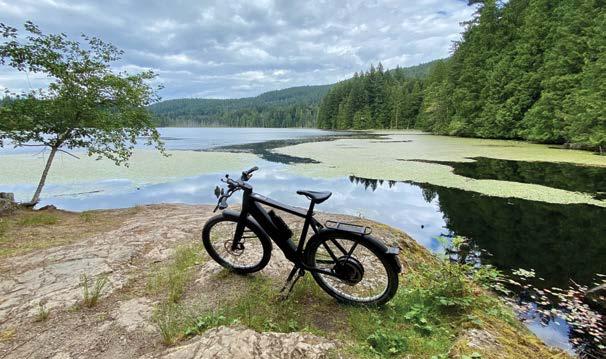
5 minute read
THEME
May It Be Your Will
Nigel Atkin
What is your Will? Is it
your economic tidying-up when finality looms; an act of common sense; a deed you concede when finite mortality is obviously apparent; or a gracious foreboding prior to entering conflict where a scenario of death might not be optional, just possible, daresay probable?
What we consider a legal declaration of a person’s wishes regarding the disposal of his or her property or estate after death, a person’s Will more than connotes intentionality regarding charitable giving, the consequence of forethought, planning and generosity of spirit, and/or the gift to individuals or to institutions.
In what still seems very recent, my “boomer” colleagues collectively convinced themselves that 60 is the new 40 and now, a decade or so later, are more positively reflecting on lives lived, contemplating their life experiences to date, and many are transferring that knowledge gained into shared and welcomed wisdom.
Early Harnessing of Willpower We need to start thinking about our “will” at a very early age, not in terms of bequeathing estate, but in terms of purpose . . . our drive in life.
Some children, when asked what they want to be when they grow up, often respond that they want to be a policeman or doctor or teacher or scientist and so on, mirroring an influence of someone they respect in their widening orbit. That is often the beginning of their developing willpower, their self-command of their own destiny and their first consciousness that they want to serve others first.
©iStockphoto.com/nattrass
In guiding youth and many others, we see that individuals, circumstances, and wishful desires evolve, as does their own will over time.
By evolving, we all heal and continue our journey toward wholeness. That is why many indigenous cultures teach that it is important to “pay attention to what has heart and meaning”—the way of the “healer,” according to Dr. Angeles Arrien.
In that way, our will transforms from child-like desires to greater purpose, from immediate pragmatic needs toward greater long-term empathic altruism. The Sacred Tree The faculty of choosing our own future actions, the exercise of “willing,” is known as volition—our will.
The clearest explanation of volition is in the book The Sacred Tree: Reflections on Native American Spirituality (1984). It teaches that attention, goalsetting, the initiating of action, perseverance and completing the action supports this “primary force in developing all of our human potentialities.”
The indigenous concept of the Medicine Wheel is explored in terms of the four aspects of our nature: the physical, the mental, the emotional, and the spiritual. “Each aspect must be equally developed in a healthy, wellbalanced individual . . . through the development and use of volition.”
When those four human aspects are maintained in continual balance, we can try to live like the people we admire, working to attain our own vision in life. The teachings are useful in life for all students, athletes, adventurers, scientists, entrepreneurs, and professionals in business and service.
The act of a conscious lifelong pursuit of a vision and managing our volition leads automatically to planning a last Will and Testament when that time is right.
What is your will becomes an important question that we ask of youth at the beginning of their journey.
The question is logical and eventually leads to another question regarding our end-of-life legacy when circumstances of health, age, and the random zaps that individuals encounter in whatever form of life they experience—the manifestation of DNA flaws, awakening viral constraints caused by pandemics, a failure to renew a tetanus shot, indirect fire, an errant oncoming vehicle. If It Be Your Will Life’s random zaps are, by their very nature, often beyond the control of the individual. They come from the unimaginable, the improbable, the often unfair and uncontrollable.
In most religious beliefs, humility is taught to practitioners.
When stating “I will see you soon,” we sometimes add “Insha’Allah” in Islam, “God willing” in Christianity . . . both mean that it is our intention to see the person again, but we recognize there are other forces afoot that could thwart our reunion in the future.
Both sayings recognize that our “free will” is tempered by a larger force, possibly that of “fate” that could easily disrupt our temporal plans.
When first listening to Antony sing Leonard Cohen’s 1984 song, If It Be Your Will, in 2006, I recognized the possibilities of those “wills” either harmonizing or clashing and that individual wills are not always in sync.
A person’s personal will is well past wishing for something. It is a conscious awareness of definitive action, an understanding of the need to align the forces of others’ wills to effect the desired change, often like a prayer.
Planning our legal Will is like that—intentionally furthering our purpose in, or beyond, our life. It is always good practice to make a Will.
Perhaps the humility of writing our legal Will helps us understand the full range of life’s possibilities and its risks . . . such as carrying an umbrella because rain is forecasted, only to use it later that sunny day for shade.
Some times as we rewrite an old Will, we are reminded of a Buddhist Koan to contemplate, to reflect upon the idea that—Great is the Problem of Birth and Death—enjoying the moment, that luxury of life to do good, and to leave a useful legacy in our Last Will and Testament. s Nigel Atkin teaches the Evolution of Public Relations course online at UVic. He offers onsite communication workshops to leverage human capital and exploit the multiplier effect of becoming better communicators.







